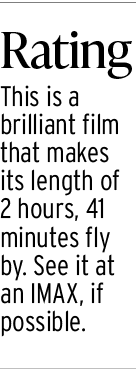Subscriber Benefit
As a subscriber you can listen to articles at work, in the car, or while you work out. Subscribe Now “Ticket to Paradise”
“Ticket to Paradise”
George Clooney and Julia Roberts had a great time basically playing themselves. In many ways they reminded me of the classic Hollywood films starring Spencer Tracy and Katharine Hepburn. Think of “Father of the Bride” (1950), “Adam’s Rib” (1949) and “State of the Union” (1948) and you’ll know what I mean.
Here they play a divorced couple who hate each other. Forced to travel to Bali, Indonesia, to upend their daughter’s proposed marriage to a seaweed farmer, neither has the emotional power to suppress their mutual contempt.
 In the process you listen to a nasty dialogue in which both Clooney and Roberts are at the top of their game. They tolerate their ugly reunification to try and have their daughter (Kaitlyn Dever), a recent law school graduate, dump her caring fiancée (Maxime Bouttier) and return to the states.
In the process you listen to a nasty dialogue in which both Clooney and Roberts are at the top of their game. They tolerate their ugly reunification to try and have their daughter (Kaitlyn Dever), a recent law school graduate, dump her caring fiancée (Maxime Bouttier) and return to the states.
The film has many twists and turns that define entertainment. Romey Poulier gives a memorable performance as Dever’s caring, college friend. In addition, watch for the turmoil that unfolds when Roberts’ lover, played by Lucas Bravo, arrives and proposes.
As noted, Clooney and Roberts interaction will leave you grinning throughout the film. Also, the cinematography is spectacular. Filmed in Queensland, Australia, near the Great Barrier Reef, you quickly want our stars to just leave and let their daughter marry a great guy and live in a spectacular part of the world reflected by the film’s title.
But do Clooney and Roberts find a way to embrace an old passion, you may ask? Another reason to see the film.
“Black Panther: Wakanda Forever”
I embraced this film from beginning to end. Sure, there were some complicated subplots combined with multiple characters that were tough to follow, but the film never loses its focus.
To begin with, it starts by honoring the late Chadwick Boseman, who played King T’Challa in the original film. Like many of us who respected Boseman for his great work in a series of films, the residents of Wakanda embraced our collective agony.
 In any event, Angela Bassett, who played T’Challa’s mother Ramonda, emerges as the leader of Wakanda. Seeking to protect her country’s unique source of vibranium, she is forced to confront world leaders to eliminate future attacks across her country’s borders.
In any event, Angela Bassett, who played T’Challa’s mother Ramonda, emerges as the leader of Wakanda. Seeking to protect her country’s unique source of vibranium, she is forced to confront world leaders to eliminate future attacks across her country’s borders.
Good people die in this film, so I dare not give anything away. However, considering it had a domestic first weekend gross of $180 million, a November box office record, most of you will want to see this movie.
Forced to emerge as Wakanda’s leader, T’Challa’s sister Shuri (Letitia Wright), leads a group to fight off an invasion of an undersea nation led by Namor, played by Tenoch Huerta Mejía in an unforgettable role. Seldom will you be so mesmerized by such a hateful character.
To director Ryan Coogler’s credit, this film is filled with some fantastic battle scenes, both on land and at sea. In addition, an all-star Black cast fights to save their home country. Danai Gurira stands out in her role as the bald-headed Okoye, Shuri’s assistant, and Lupita Nyong’o displays her talent as the war dog Nakia.
Ironically, there are a couple of small roles by white actors, which includes Martin Freeman as CIA ally Everett Ross and his nasty boss (and ex-wife) played by Julia Louis-Dreyfus. You have a feeling both will likely appear in any future films.
Let me close by noting two things. The first is that “Wakanda” joins “The Woman King” and “Till” as two great films with a cast dominated by African American actors. This is a significant social step forward for Hollywood.
Second, like “The Woman King,” Wakanda focuses on the role that racism played as Europe began conquering North and South America beginning in the 1500s. The undersea nation led by Namor was originally from the Yucatan until driven to the sea by the Spanish to escape the spread of smallpox.
This is an entertaining film that has meaning.•
__________
Robert Hammerle practices criminal law in Indianapolis. When he is not in the courtroom or the office, Bob can likely be found at one of his favorite movie theaters preparing to review the latest films. To read more of his reviews, visit www.bigmouthbobs.com. Opinions expressed are those of the author.
Please enable JavaScript to view this content.
